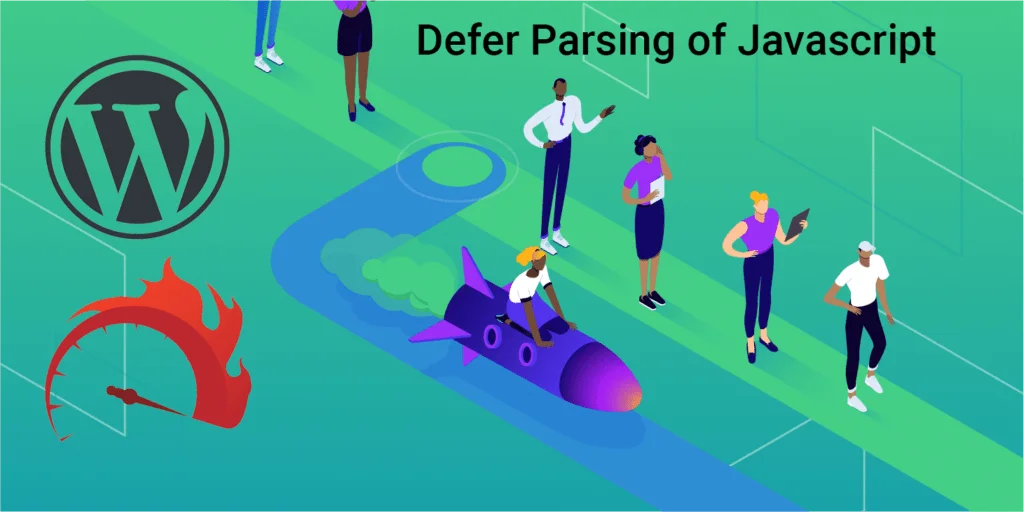How to Defer Parsing of Javascript in WordPress

Elevating your website’s speed isn’t just about keeping pace with the digital world; it’s about setting the standard. In an era where every second counts, optimizing your website’s loading time through deferred JavaScript parsing isn’t just smart—it’s essential. Let’s dive deeper into this strategy, exploring its nuances, and providing you with a comprehensive guide to revolutionize your site’s performance.
The Imperative of Speed in the Digital Landscape
In the bustling online marketplace, your website’s speed is akin to the first impression in a job interview—it matters immensely. Slow loading times not only test the patience of your audience but can also deter potential visitors, impacting your site’s bounce rate and engagement metrics negatively. This is where the magic of deferring JavaScript parsing comes into play, offering a seamless solution to enhance your site’s agility and user experience.
Understanding Deferred JavaScript Parsing
Before we explore the implementation, it’s crucial to grasp the concept of deferred JavaScript parsing fully. When a browser loads a webpage, it must parse the HTML before rendering the page. If it encounters JavaScript, it must pause, download, and execute the script, delaying the rendering process. By deferring the parsing, the browser can continue loading the rest of the page without waiting for the JavaScript, ensuring that critical content is displayed to the user as quickly as possible.
Step-by-Step Guide to Deferring JavaScript in WordPress
Leveraging the Speed Booster Pack plugin, WordPress users can effortlessly defer JavaScript parsing. Here’s a detailed walkthrough to ensure a smooth setup:
- Plugin Installation: Access your WordPress dashboard, navigate to Plugins -> Add New, search for “Speed Booster Pack”, and install and activate the plugin.
- Configuration: In the WordPress sidebar, click on Speed Booster to open the plugin’s settings. Head to the Advanced Tab and enable the Defer Parsing of JS Files option.
- Compatibility Check: Given the diversity of WordPress themes and plugins, ensure that the Speed Booster Pack works harmoniously with your site’s specific configuration.
- Performance Analysis: Utilize tools like GTMetrix to evaluate your website’s speed post-implementation, allowing you to witness the tangible benefits of deferred JavaScript parsing.
Advanced Tips for Optimizing Website Speed
Beyond deferring JavaScript, several strategies can further augment your site’s performance:
- Optimize Images: High-resolution images can significantly slow down your website. Opt for optimized image formats like WebP, and consider lazy loading to enhance speed.
- Leverage Browser Caching: Browser caching stores elements of your website in the user’s browser, reducing loading times on subsequent visits.
- Minimize HTTP Requests: Reduce the number of elements on your page, such as scripts, images, and CSS files, to decrease the number of HTTP requests and speed up your site.
- Use a Content Delivery Network (CDN): A CDN stores copies of your site on servers around the world, allowing users to access it from a location nearest to them, thereby reducing load times.
Frequently Asked Questions Expanded
Q: How does deferred JavaScript parsing impact mobile users?
A: With the increasing predominance of mobile browsing, optimizing your site’s speed for mobile users is paramount. Deferred JavaScript parsing significantly enhances the mobile user experience by reducing load times and improving responsiveness.
Q: Are there any risks to deferring JavaScript parsing?
A: While deferring JavaScript is generally beneficial, it’s essential to ensure that scripts essential for initial page rendering are not deferred, as this could lead to functionality issues.
Q: Can deferred JavaScript parsing be implemented on non-WordPress sites?
A: Absolutely. While this guide focuses on WordPress, the principle of deferred JavaScript parsing can be applied to any website. For non-WordPress sites, you may need to manually add the defer attribute to your <script> tags or use other site optimization tools.
The Road Ahead
As you embark on this journey to supercharge your website’s speed through deferred JavaScript parsing, remember that website optimization is an ongoing process. Regularly monitoring your site’s performance, staying updated with the latest optimization techniques, and adapting to the ever-evolving web standards will ensure your website not only meets but exceeds the expectations of your users and search engines alike.
By embracing these strategies, you’re not just enhancing your website’s speed; you’re crafting a digital experience that resonates with efficiency, engagement, and excellence. Keep pushing the boundaries, and watch as your site ascends to new heights in the digital realm.